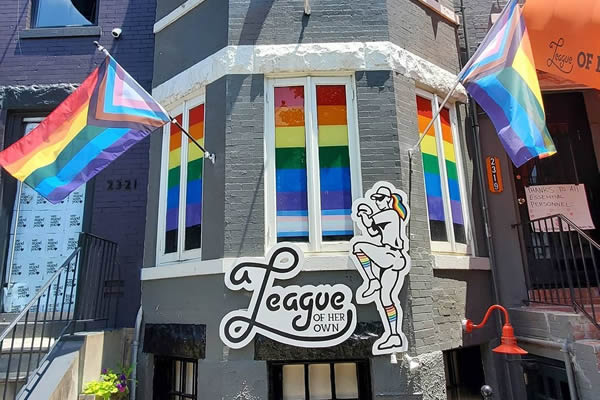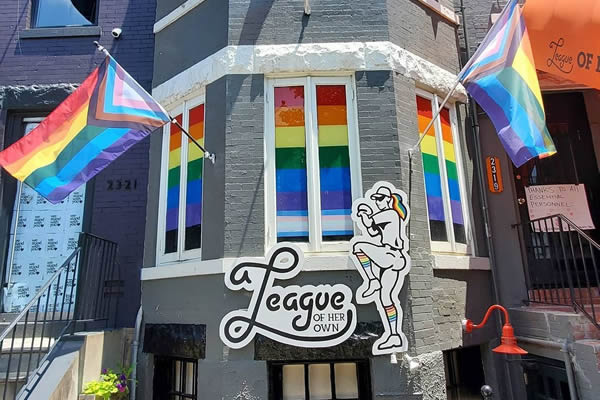
A female transgender student at the University of the District of Columbia on Aug. 2 filed a discrimination complaint against the university on grounds that it is violating the city’s Human Rights Act by continuing to use her legal name on school documents and class enrollment lists unless she obtains a legal name change.
Emma K. Alexandra, 28, a part-time student who was admitted to UDC in April, states in her complaint filed with the D.C. Office of Human Rights that she informed UDC officials that she was not ready to immediately undertake a legal name change. She states in her complaint that she has repeatedly asked that her chosen name alone be used on all documents and student lists that can be viewed by fellow students and professors.
She said she understands that her legal name may be needed for legal admissions and academic transcript related documents. But to her dismay, Alexandra told the Washington Blade, UDC officials put in place what they consider a compromise position that identifies her on all public university documents and student class lists by both her legal name and her chosen name.
She said the university began and currently continues to identify her by her male legal name with her preferred name written next to her legal name inside parentheses in this way: Legal First Name (preferred name Emma); Legal last name (preferred name Alexandra).
“This is an egregious solution,” Alexandra told UDC President Ronald Mason Jr. in a July 4 email. “This is the name that appears everywhere now,” she wrote Mason. “Most notable, it’s the name that was displayed to my fellow students and professor during the class I took this summer on Blackboard,” she said, which is an online site like Zoom on which UDC conducts classes.
“This effectively outed me as trans to every other student and my professor,” she told Mason. “I assume the same will continue when I go to campus in the fall and get an ID. My ID will have this name and out me to everyone I show it to,” she wrote. “This is completely unacceptable, disrespectful and dangerous.”
Alexandra said she currently works full time as a Web Application Architect for Bloomberg Industry Group as part of its News Engineering team. She said the company is fully accepting of her using her chosen name without obtaining a legal name change. She said she has enrolled at UDC to take courses she needs to qualify for applying to medical school to fulfill her dream of becoming a psychiatrist.
Under longstanding procedures, the D.C. Office of Human Rights investigates discrimination complaints and usually calls on both parties to consider reaching a conciliation agreement over the complaint if possible. If conciliation cannot be reached, OHR makes a determination of whether probable cause exists that discrimination occurred in violation of D.C. law.
If such a determination is made, the case is sent to the D.C. Commission on Human Rights, which conducts a trial-like hearing that includes testimony by witnesses before it issues a ruling on the case.
In response to a question from the Blade about whether a refusal by a D.C. university to use a transgender person’s chosen name violates the Human Rights Act, OHR Director Monica Palacio said OHR cannot provide legal advice on such a question. But in a statement to the Blade, Palacio said for educational institutions, the Human Rights Act prohibits discrimination based on 15 protected characteristics, including gender identity and expression.
OHR’s regulations related to educational institutions “prohibit creating a hostile environment which could include deliberately misgendering a student,” Palacio said. “If anyone believes the statute has been violated, they may file a complaint with OHR,” she said. “OHR investigations are confidential.”
Alexandra said she had yet to receive a direct reply to her email message to Mason as of early this week. But last week she was contacted by phone by an official from the university’s admissions office and from Dr. William Latham, UDC’s Chief Student Development and Success Officer on behalf of Mason.
According to Alexandra, the two explained that her legal name was needed on certain legal documents. She said Latham explained that a software system the university uses to manage student records known as the Banner system, doesn’t support preferred names and currently prevents the school from displaying only her preferred name.
The officials said the university planned to upgrade to a newer version of Banner in October and the new system “may” support using preferred names, Alexandra said.
“Overall, I thought this was a really ridiculous conversation where folks from UDC tried to convince me that they are using my preferred name while also stating that they cannot use my preferred name as it should be used, mostly due to limitations of software,” Alexandra told the Blade. “I don’t think the Human Rights Act has an exception for software systems,” she said.
The Blade contacted UDC President Mason by email on July 20, asking him to comment on Alexandra’s concerns and asking him what, if any, problems would be caused if the university used Alexandra’s chosen name rather than her legal name on the various public, external documents and lists in which her legal name is being used.
“In response to your July 20 email, the Office of the Registrar can enter the student’s preferred name in Banner (via all access screen for faculty and staff awareness), however all official documents, such as the academic transcript, will require the use of the student’s official legal name,” Mason told the Blade in a one-sentence response.
His response didn’t address the issue raised by UDC official Latham in his phone conversation with Alexandra in which Latham said the Banner software system couldn’t currently identify Alexandra only by her chosen name. Mason also didn’t respond to the Blade’s question of why UDC could not adopt a policy like the D.C. Public Schools system, which accepts a request by transgender students to use their chosen name without having to obtain a legal name change.
Alexandra, meanwhile, points out that UDC’s refusal so far to allow her chosen name alone to be used on all public university documents and student lists without her legal name being attached to it appears to be at odds with a May 4 open letter Mason released to the university community expressing strong support for using the appropriate pronouns for transgender and gender non-conforming students.
“The University of the District of Columbia (UDC) strives to be an inclusive campus that supports and values all members of our community, including LGBTQIA+, nonbinary, intersex and gender non-conforming students,” Mason says in his letter.
“Choosing to not use or ignore the pronouns someone has requested you to use implies that person shouldn’t and doesn’t exist and does not deserve respect,” Mason wrote in his letter. “Therefore, we encourage all faculty and staff to use pronouns in their email signatures as an act of solidarity and to foster a culture of respect for every Firebird,” he concludes in referring to the symbolic name used for members of the UDC community.
UDC is governed by a 15-member independent Board of Trustees. Eleven of the members are appointed by the D.C. mayor and confirmed by the D.C. Council. Three are appointed by UDC alumni and one by students, according to information on the UDC website.






